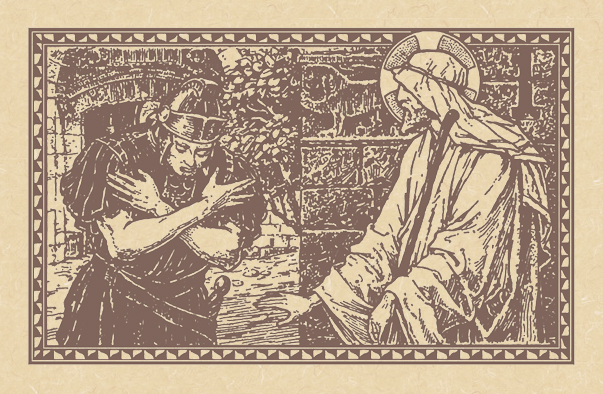Halt! Who Goes There?
The Twenty-First Thursday of Ordinary Time.
Lessons from the primary feria, according to the ordinary form of the Roman Rite:
• I Thessalonians 3: 7-13.
• Psalm 90: 3-5, 12-14, 17.
• Matthew 24: 42-51.
The Third Class Feast of Saint Raymond Nonnatus, Confessor.*
Lessons from the common "Os justi…" of a Confessor not a Bishop, according to the extraordinary form of the Roman Rite:
• Ecclesiasticus 31: 8-11.
• Psalm 91: 13-14, 3.
• Luke 12: 35-40.
The Twelfth Thursday after Pentecost; and, the Feast of the Deposition of the Venerable Belt of the Most Holy Theotokos.**
First & third lessons from the menaion, second & fourth from from the pentecostarion, according to the Ruthenian recension of the Byzantine Rite:
• Hebrews 9: 1-7.
• II Corinthians 10: 7-18.
• Luke 10: 38-42; 11: 27-28.
• Mark 3: 28-35.
FatherVenditti.com
|
 9:55 AM 8/31/2017 — The imagery of the Gospel lesson of today's Mass is simple enough: our Lord exhorts us to remain awake, watchful and on guard against the enemy who never sleeps. This night watchman metaphor was continued many times by the Blessed Apostle Paul, as he compared the watchfulness of the Christian to the guard-duty of the well-armed sentry who cannot allow himself to be taken by surprise. In fact, Paul often speaks about the Christian life as one of being like a soldier on active service. 9:55 AM 8/31/2017 — The imagery of the Gospel lesson of today's Mass is simple enough: our Lord exhorts us to remain awake, watchful and on guard against the enemy who never sleeps. This night watchman metaphor was continued many times by the Blessed Apostle Paul, as he compared the watchfulness of the Christian to the guard-duty of the well-armed sentry who cannot allow himself to be taken by surprise. In fact, Paul often speaks about the Christian life as one of being like a soldier on active service.
The whole point of the lesson is that we can't allow ourselves to be distracted from the enterprise of our eternal salvation; or, as I've put it to you many times, our one reason for being on this earth is to work out our salvation. Everything else is just window dressing. It's easy enough to forget when even the Church, it seems, allows herself to become distracted with things that, in past ages, the spiritual doctors would warn us pertain only tangentially to eternal realities: concern for the poor, concern for the environment, the dabbling in economic theory, making pronouncements about migrants and immigrants and the social structure of society. I'm not suggesting that these things aren't important or have no relationship to our quest for heaven; I am suggesting that they are peripherals. Like all secular concerns, our involvement in them can serve only as a tool to assisting us in working out our salvation; but, ultimately, on our death beds, they won't matter in and of themselves, but only inasmuch as they guided and motivated us to make our souls ready for judgment.
Msgr. Knox, who had a knack for putting things in a plain way, during a retreat for lay people, once likened the proper attitude of the Christian to the prudent servant of our Lord's parable who has been placed in charge of his master's estate and who, while awaiting the master's return, spends his time, as Msgr. Knox puts it…
…doing a hundred little jobs against time; always a room to be dusted here, a floor to be polished there, a fire to be made up in this room or that, so that the house shall look a hundred per cent welcoming when he steps inside. Each of us has got a job to do; each of us should be inspired to do it better, especially if it looks as if we hadn't got much time to do it in (R. A. Knox, A Retreat for Lay People, pp. 45-46).
Of course, we can’t escape the fact that there are—and will always be—pragmatic temporal concerns which require our attention, but we have to do what we can to put these in proper perspective since, as I said, they don't pertain directly to our eternal salvation, and can only distract us.
As recounted by Saint Paul in our first lesson from First Thessalonians, the early Christians fulfilled our Lord's new commandment to love one another so well that the pagans were able to recognize them simply by the love they had for one another. Their charity was expressed in their concern for each others needs and the help they gave one another to remain steadfast in the faith, even in the face of martyrdom. They had what that Father of the Church, Tertullian, called the statio: a military term meaning “being on guard.”
Let us always cultivate the statio, always be on watch, so that when the Master returns home, the house will not be in a shambles because we allowed ourselves to be distracted by things that simply didn't matter.

* With Ss. Peter Nodasco and Raymond of Pennafort, founders of the Order of Our Lady of Mercy, Raymond Nonnatus is the glory of his Congregation. He gave himself up to the Mohammedans to ransom a Christian, during which captivity Pope Gregory IX created him cardinal. He died upon his return in 1240.
** According to pious legend, the cinture of the Blessed Virgin was discovered in the days of Emperor Justinian (527-565). This feast celebrates not its discovery, but its transfer to a reliquary in Chalcoprateia in 941. As usual, there is nothing to substantiate the legend other than long-standing tradition and popular devotion.
|

